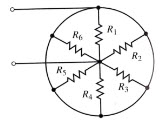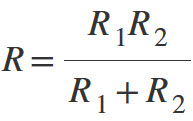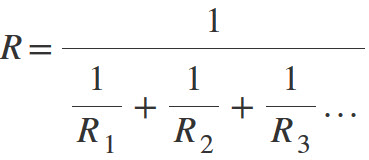 |
Jack Ganssle's Blog This is Jack's outlet for thoughts about designing and programming embedded systems. It's a complement to my bi-weekly newsletter The Embedded Muse.
Contact me at jack@ganssle.com. I'm an old-timer engineer who still finds the field endlessly fascinating (bio).
This is Jack's outlet for thoughts about designing and programming embedded systems. It's a complement to my bi-weekly newsletter The Embedded Muse.
Contact me at jack@ganssle.com. I'm an old-timer engineer who still finds the field endlessly fascinating (bio). |
Remembering Circuit Theory
December 27, 2018
For those of you who studied electrical engineering in college, remember the circuit theory course?
It has been almost half a century since I took that class, and my memories of it are vague. But I find electronics fun and fascinating, so thought it might be worthwhile to revisit that material. Lord knows what happened to most of my college textbooks, so I ordered Circuit Analysis, Theory and Practice (by Robbins and Miller) from Abebooks. It's a thousand-page tome that must weigh in at over five pounds. The price (used): $3.70, with free shipping. What a deal! I can't imagine how they make any money on it.
I'm 600 pages in at the moment and have been surprised and gratified to find I remember most of the material. Norton's and Thevenin's Theorems, Kirchhoff's Laws, and more still lurked in these decaying gray cells.
Yet in 45 years of being a practicing EE I've never once used these fundamental principles. They're good to know, and foundational to analyzing circuit networks. It's like knowing how to integrate a simple differential equation to get the formula for an RC time constant… but in practice, in the real world, one only uses the resultant formula:

Then, in AC circuits, there are phasors. No, not the kind Captain Kirk uses against the Klingons (and which are spelled "phaser"), but the rotating vectors used to represent phase and magnitude of a sine wave. A rotating vector? Doesn't that sort of break the rules of vectors, which are entities that have magnitude and direction? Well, at any point in time a phasor does have those properties. I don't think I really understood them while struggling through that class. Now they make sense, but still seem quite cumbersome compared to the trig:

I have to convert a phasor expression to the trig to solve real-world problems, but that could be a flaw in my understanding.
Though I've used the trig formulation thousands of time in my career, I've never used the phasor representation.
Then there are the problems students need to solve. Every chapter ends with a lot of these, some of which are incredibly convoluted. THAT I remember: for instance, reducing some absurd network of resistors to one equivalent value. Jeez, the profs made us burn some serious brain cells doing this. Here's an example problem from the book:

Perhaps young, malleable minds need to struggle through the contortions needed to reduce this to a single equivalent resistor. Perhaps doing so drives the basic ideas of series and parallel resistors indelibly into a budding engineer's psyche.
In the real world I've used the classic formula for two resistors in parallel a zillion times:

And the more generalized one for many resistors a few times:

But to solve for a nasty resistor network like the one above? Never. Need a resistor? Calculate the required value, check the Digi-Key site, and buy one with the closest value to that required. Problem solved.
Then there was that statics class. That was tough. The next semester things got so much worse in dynamics where everything was moving! Ironically, I do use statics a lot, but for computing loads on my sailboat or moving logs around the yard. Never in electrical engineering.
I was an electronics nerd long before starting at the University of Maryland and found that the formal education gave a theoretical grounding to the practical knowledge gleaned from years of messing about with circuits. I do appreciate those years suffering under the tutelage of the academics.
One of the best books on electronics is The Art of Electronics by Horowitz and Hill. It's very practical and written to appeal to people who design things. It's short on theory; you won't find a complex number anywhere. So I'm tremendously enjoying Circuit Theory which is the philosophical conjugate to of the H&H book, sort of existing on the j axis while H&H are in the real domain.
Feel free to email me with comments.
If you'd like to post a comment without logging in, click in the "Name" box under "Or sign up with Disqus" and click on "I'd rather post as a guest."
Recent blog postings:
- Non Compos Mentis - Thoughts on dementia.
- Solution to the Automotive Chip Shortage - why use an MCU when a Core I7 would work?
- The WIRECARE - A nice circuit tester
- Marvelous Magnetic Machines - A cool book about making motors
- Over-Reliance on GPS - It's a great system but is a single point of failure
- Spies in Our Email - Email abuse from our trusted friends
- A Canticle for Leibowitz - One of my favorite books.
- A 72123 beats per minute heart rate - Is it possible?
- Networking Did Not Start With The IoT! - Despite what the marketing folks claim
- In-Circuit Emulators - Does anyone remember ICEs?
- My GP-8E Computer - About my first (working!) computer
- Humility - On The Death of Expertise and what this means for engineering
- On Checklists - Relying on memory is a fool's errand. Effective people use checklists.
- Why Does Software Cost So Much? - An exploration of this nagging question.
- Is the Future All Linux and Raspberry Pi? - Will we stop slinging bits and diddling registers?
- Will Coronavirus Spell the End of Open Offices - How can we continue to work in these sorts of conditions?
- Problems in Ramping Up Ventilator Production - It's not as easy as some think.
- Lessons from a Failure - what we can learn when a car wash goes wrong.
- Life in the Time of Coronavirus - how are you faring?
- Superintelligence - A review of Nick Bostrom's book on AI.
- A Lack of Forethought - Y2K redux
- How Projects Get Out of Control - Think requirements churn is only for software?
- 2019's Most Important Lesson. The 737 Max disasters should teach us one lesson.
- On Retiring - It's not quite that time, but slowing down makes sense. For me.
- On Discipline - The one thing I think many teams need...
- Data Seems to Have No Value - At least, that's the way people treat it.
- Apollo 11 and Navigation - In 1969 the astronauts used a sextant. Some of us still do.
- Definitions Part 2 - More fun definitions of embedded systems terms.
- Definitions - A list of (funny) definitions of embedded systems terms.
- On Meta-Politics - Where has thoughtful discourse gone?
- Millennials and Tools - It seems that many millennials are unable to fix anything.
- Crappy Tech Journalism - The trade press is suffering from so much cost-cutting that it does a poor job of educating engineers.
- Tech and Us - I worry that our technology is more than our human nature can manage.
- On Cataracts - Cataract surgery isn't as awful as it sounds.
- Can AI Replace Firmware - A thought: instead of writing code, is the future training AIs?
- Customer non-Support - How to tick off your customers in one easy lesson.
- Learn to Code in 3 Weeks! - Firmware is not simply about coding.
- We Shoot For The Moon - a new and interesting book about the Apollo moon program.
- On Expert Witness Work - Expert work is fascinating but can be quite the hassle.
- Married To The Team - Working in a team is a lot like marriage.
- Will We Ever Get Quantum Computers - Despite the hype, some feel quantum computing may never be practical.
- Apollo 11, The Movie - A review of a great new movie.
- Goto Considered Necessary - Edsger Dijkstra recants on his seminal paper
- GPS Will Fail - In April GPS will have its own Y2K problem. Unbelievable.
- LIDAR in Cars - Really? - Maybe there are better ideas.
- Why Did You Become an Engineer? - This is the best career ever.
- Software Process Improvement for Firmware - What goes on in an SPI audit?
- 50 Years of Ham Radio - 2019 marks 50 years of ham radio for me.
- Medical Device Lawsuits - They're on the rise, and firmware is part of the problem.
- A retrospective on 2018 - My marketing data for 2018, including web traffic and TEM information.
- Remembering Circuit Theory - Electronics is fun, and reviewing a textbook is pretty interesting.
- R vs D - Too many of us conflate research and development
- Engineer or Scientist? - Which are you? John Q. Public has a hard time telling the difference.
- A New, Low-Tech, Use for Computers - I never would have imagined this use for computers.
- NASA's Lost Software Engineering Lessons - Lessons learned, lessons lost.
- The Cost of Firmware - A Scary Story! - A hallowean story to terrify.
- A Review of First Man, the Movie - The book was great. The movie? Nope.
- A Review of The Overstory - One of the most remarkable novels I've read in a long time.
- What I Learned About Successful Consulting - Lessons learned about successful consulting.
- Low Power Mischief - Ultra-low power systems are trickier to design than most realize.
- Thoughts on Firmware Seminars - Better Firmware Faster resonates with a lot of people.
- On Evil - The Internet has brought the worst out in many.
- My Toothbrush has Modes - What! A lousy toothbrush has a UI?
- Review of SUNBURST and LUMINARY: An Apollo Memoir - A good book about the LM's code.
- Fun With Transmission Lines - Generating a step with no electronics.
- On N-Version Programming - Can we improve reliability through redundancy? Maybe not.
- On USB v. Bench Scopes - USB scopes are nice, but I'll stick with bench models.

